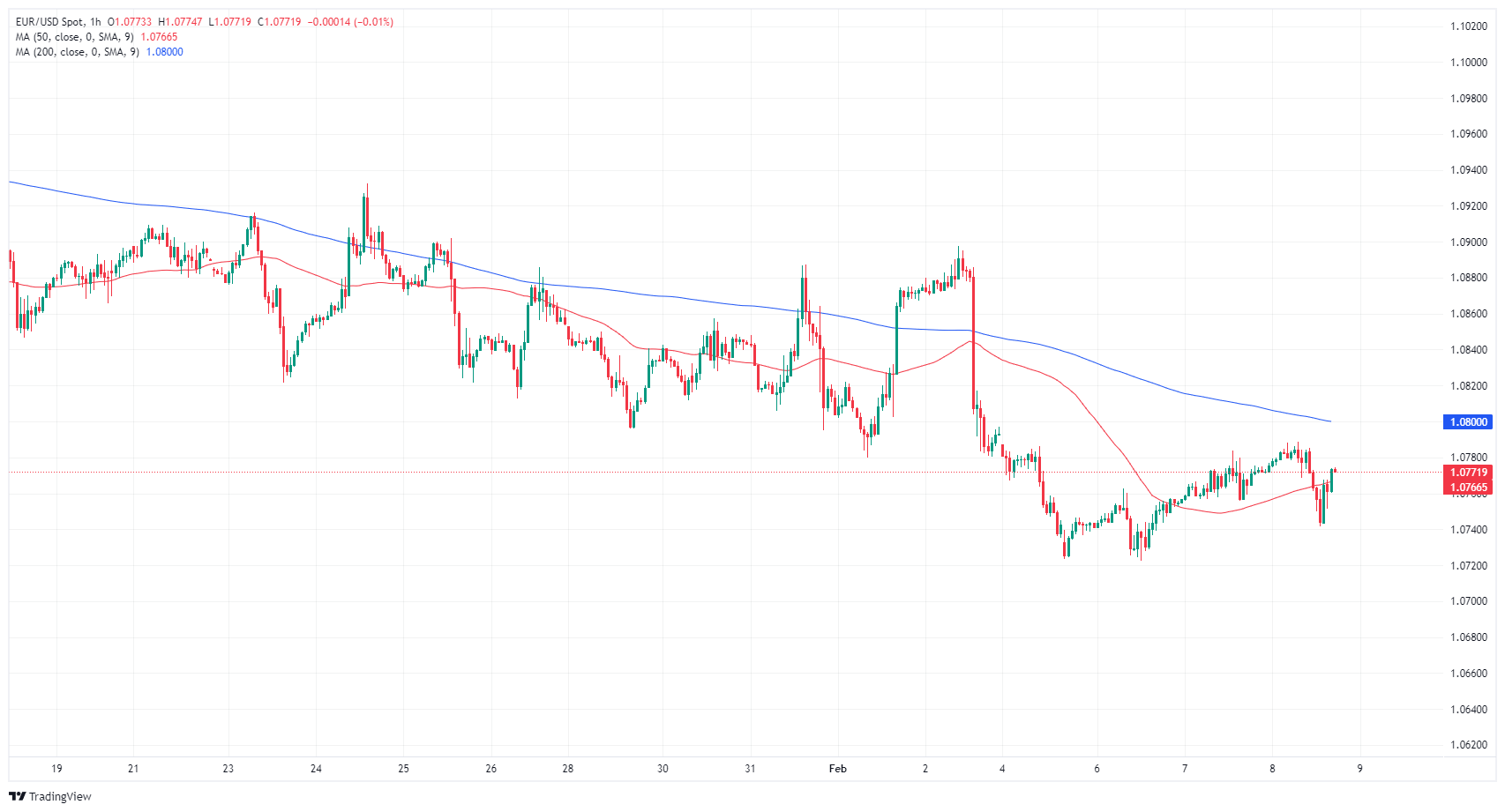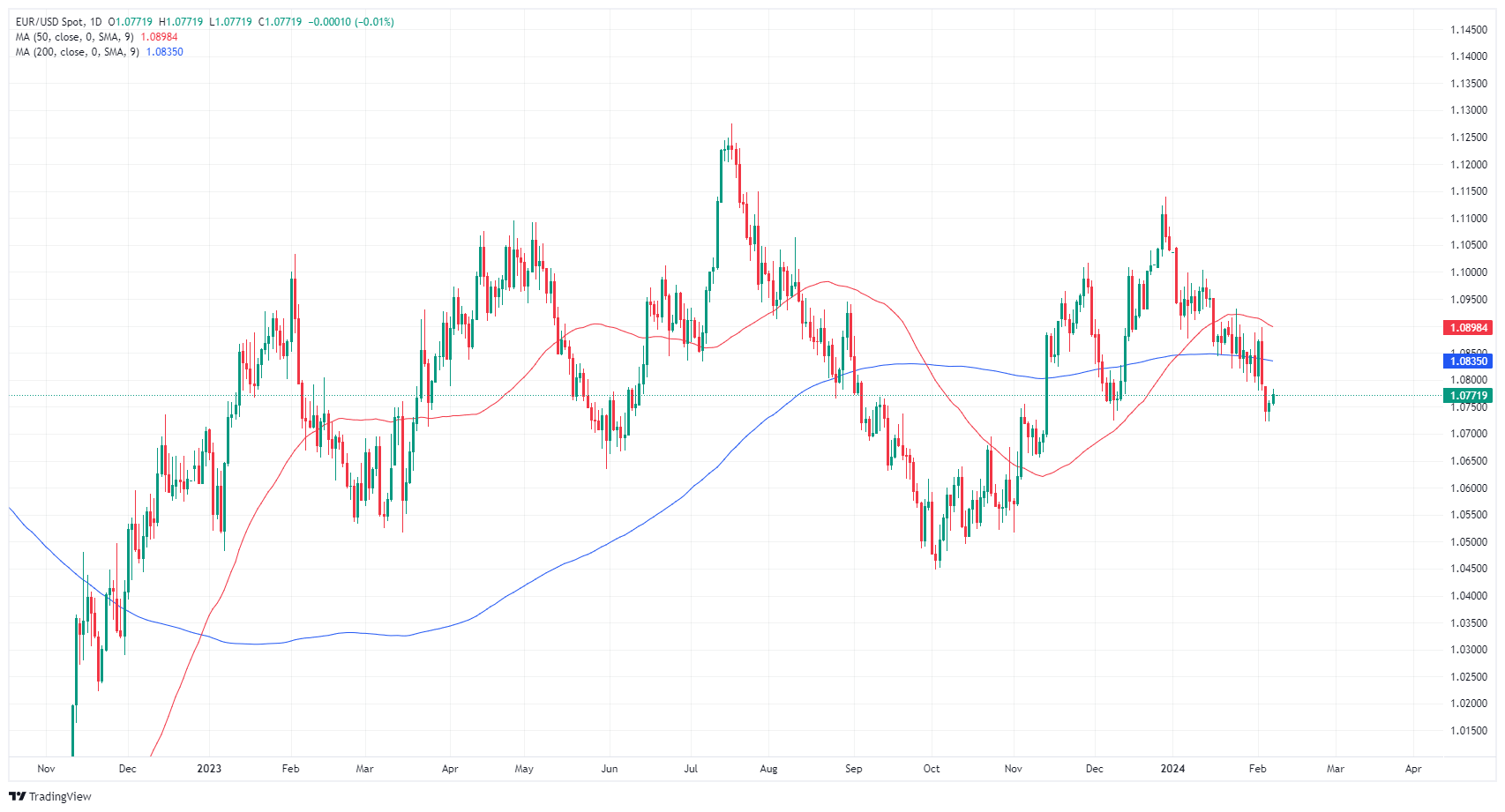- Analytics
- News and Tools
- Market News
- EUR/USD remains hobbled, recovery capped below 1.0800
EUR/USD remains hobbled, recovery capped below 1.0800
- EUR/USD found little support from ECB Economic Bulletin.
- US Initial Jobless Claims provided little spark for markets.
- Euro traders look to Friday’s Germany HICP inflation.
EUR/USD tested into a near-term low of 1.0741 on Thursday as the latest Economic Bulletin from the European Central Bank (ECB) provided little new information for investors looking for guidance on when to expect rate cuts. The ECB continues to grapple with a lopsided European economy. Euro area price pressures remain higher than the ECB would like to see despite an ongoing softening in broad economic figures and faltering growth for the European economy.
US Initial Jobless Claims came in slightly better than expected, but a mid-tier data schedule for the US this week is keeping broad-market risk appetite hanging relatively in the middle.
Daily Digest Market Movers: EUR/USD remains caught in near-term cycle
- ECB’s Economic Bulletin reveals little new, peels back the layers on hampered ECB.
- Inflation continues to decline.
- Rates will remain sufficiently restrictive.
- Inflation is expected to keep easing through 2024.
- Economic risks remain tilted to the downside.
- Elevated wage growth, declining labor productivity keeps price pressure high.
- US Initial Jobless Claims printed at 218K for the week ended February 2, markets expected 220K.
- Four-week average Initial Jobless Claims ticked higher to 212.25K from 208.5K (revised up from 207.75K).
- Richmond Federal Reserve (Fed) President Thomas Barkin on Thursday:
- Fed Chairman Jerome Powell speaks for the Federal Open Market Committee, will not undercut or explain the Chairman’s statements.
- Fed remains focused on inflation and unemployment, not US government debt.
- An economic downturn would be a case for a rate cut.
- The Fed has plenty of time to remain patient on rate changes.
- Fed is in no rush to cut rates.
- Barkin won’t take too much signal from single-month data.
- Remains cautious regarding the accuracy of economic numbers at the start of the year, but data remains remarkable.
- Friday’s YoY German Harmonized Index of Consumer Prices (HICP) inflation report is expected to hold steady at 3.1% for January, with the MoM figure likewise forecast to hold steady at -0.2%.
Euro price today
The table below shows the percentage change of Euro (EUR) against listed major currencies today. Euro was the strongest against the Japanese Yen.
| USD | EUR | GBP | CAD | AUD | JPY | NZD | CHF | |
| USD | 0.03% | 0.09% | 0.01% | 0.49% | 0.82% | 0.29% | -0.05% | |
| EUR | -0.03% | 0.06% | 0.00% | 0.47% | 0.79% | 0.26% | -0.09% | |
| GBP | -0.09% | -0.05% | -0.06% | 0.41% | 0.74% | 0.20% | -0.16% | |
| CAD | -0.02% | 0.01% | 0.06% | 0.47% | 0.80% | 0.27% | -0.09% | |
| AUD | -0.50% | -0.47% | -0.41% | -0.47% | 0.33% | -0.20% | -0.57% | |
| JPY | -0.83% | -0.81% | -0.75% | -0.81% | -0.33% | -0.54% | -0.89% | |
| NZD | -0.29% | -0.26% | -0.20% | -0.27% | 0.21% | 0.53% | -0.36% | |
| CHF | 0.07% | 0.09% | 0.15% | 0.09% | 0.57% | 0.88% | 0.36% |
The heat map shows percentage changes of major currencies against each other. The base currency is picked from the left column, while the quote currency is picked from the top row. For example, if you pick the Euro from the left column and move along the horizontal line to the Japanese Yen, the percentage change displayed in the box will represent EUR (base)/JPY (quote).
Technical analysis: EUR/USD cycles on Thursday as pair remains mired in low-side technical trap
EUR/USD dipped on Thursday, falling toward 1.0740 before seeing a brief pullback in the US market session, but the pair remains hamstrung below the 200-hour Simple Moving Average (SMA) at 1.0800.
Daily candlesticks have EUR/USD stuck on a near-term technical support level from 1.0750, and bidders will be tempted to drive the pair back into the bullish side of the 200-day SMA at 1.0835. The EUR/USD remains down over 3% from December’s peak bids at 1.1140.
EUR/USD hourly chart
EUR/USD daily chart
Euro FAQs
What is the Euro?
The Euro is the currency for the 20 European Union countries that belong to the Eurozone. It is the second most heavily traded currency in the world behind the US Dollar. In 2022, it accounted for 31% of all foreign exchange transactions, with an average daily turnover of over $2.2 trillion a day.
EUR/USD is the most heavily traded currency pair in the world, accounting for an estimated 30% off all transactions, followed by EUR/JPY (4%), EUR/GBP (3%) and EUR/AUD (2%).
What is the ECB and how does it impact the Euro?
The European Central Bank (ECB) in Frankfurt, Germany, is the reserve bank for the Eurozone. The ECB sets interest rates and manages monetary policy.
The ECB’s primary mandate is to maintain price stability, which means either controlling inflation or stimulating growth. Its primary tool is the raising or lowering of interest rates. Relatively high interest rates – or the expectation of higher rates – will usually benefit the Euro and vice versa.
The ECB Governing Council makes monetary policy decisions at meetings held eight times a year. Decisions are made by heads of the Eurozone national banks and six permanent members, including the President of the ECB, Christine Lagarde.
How does inflation data impact the value of the Euro?
Eurozone inflation data, measured by the Harmonized Index of Consumer Prices (HICP), is an important econometric for the Euro. If inflation rises more than expected, especially if above the ECB’s 2% target, it obliges the ECB to raise interest rates to bring it back under control.
Relatively high interest rates compared to its counterparts will usually benefit the Euro, as it makes the region more attractive as a place for global investors to park their money.
How does economic data influence the value of the Euro?
Data releases gauge the health of the economy and can impact on the Euro. Indicators such as GDP, Manufacturing and Services PMIs, employment, and consumer sentiment surveys can all influence the direction of the single currency.
A strong economy is good for the Euro. Not only does it attract more foreign investment but it may encourage the ECB to put up interest rates, which will directly strengthen the Euro. Otherwise, if economic data is weak, the Euro is likely to fall.
Economic data for the four largest economies in the euro area (Germany, France, Italy and Spain) are especially significant, as they account for 75% of the Eurozone’s economy.
How does the Trade Balance impact the Euro?
Another significant data release for the Euro is the Trade Balance. This indicator measures the difference between what a country earns from its exports and what it spends on imports over a given period.
If a country produces highly sought after exports then its currency will gain in value purely from the extra demand created from foreign buyers seeking to purchase these goods. Therefore, a positive net Trade Balance strengthens a currency and vice versa for a negative balance.
© 2000-2026. All rights reserved.
This site is managed by Teletrade D.J. LLC 2351 LLC 2022 (Euro House, Richmond Hill Road, Kingstown, VC0100, St. Vincent and the Grenadines).
The information on this website is for informational purposes only and does not constitute any investment advice.
The company does not serve or provide services to customers who are residents of the US, Canada, Iran, The Democratic People's Republic of Korea, Yemen and FATF blacklisted countries.
Making transactions on financial markets with marginal financial instruments opens up wide possibilities and allows investors who are willing to take risks to earn high profits, carrying a potentially high risk of losses at the same time. Therefore you should responsibly approach the issue of choosing the appropriate investment strategy, taking the available resources into account, before starting trading.
Use of the information: full or partial use of materials from this website must always be referenced to TeleTrade as the source of information. Use of the materials on the Internet must be accompanied by a hyperlink to teletrade.org. Automatic import of materials and information from this website is prohibited.
Please contact our PR department if you have any questions or need assistance at pr@teletrade.global.















